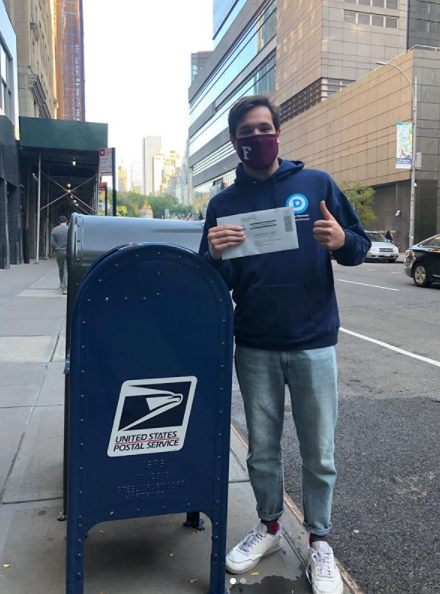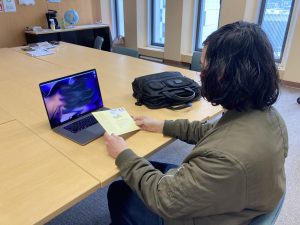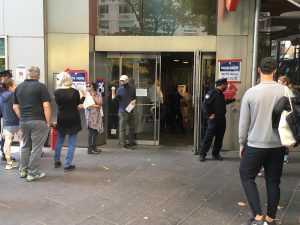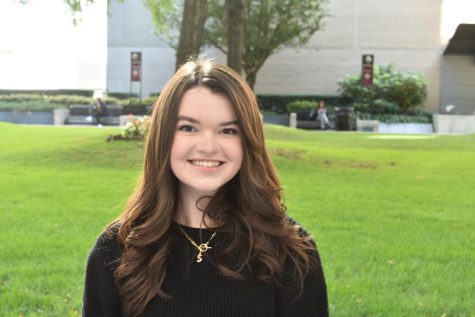Democracy on Campus: Valuing Both Student and National Elections

COURTESY OF ROBERT SUNDSTROM
Robert Sundstrom, FCLC ’22 and USG vice president, mails his ballot for the upcoming national election.
October 28, 2020
With the 2020 election around the corner, most students at Fordham Lincoln Center (FLC) have become acutely aware of the political status of the nation. However, there is a political landscape closer to home that students don’t often pay attention to. The United Student Government (USG) is the most local governing body responsible for creating policies that affect the everyday lives of students at FLC.
In September, USG held an election to vote in a new vice president. Many students on the FLC campus did not vote, with only 9% of the student population participating. However, FLC is on trend with other university student government voter turnout percentages. According to a study conducted by the Michigan Daily, the average percentage of voters in student government elections across thirteen universities was 9.8% in 2019.
These percentages are awfully low compared to the national voter turnout of college students in the 2016 presidential election, which was roughly 48%. So Most students do not pay close attention to the closest political landscape that impacts their daily lives: student government.
Hannah Quirk, Gabelli School of Business at Lincoln Center ’23, did not vote in the past USG election, but has already voted in the presidential election. “I was not even aware of the USG elections and my mind was so preoccupied with life in general,” she said. She added that she believes that only students who are active in the campus community vote in USG elections because it is not commonplace for everyone to do so.
“There are certain complications, like budgeting or rules, that come from the admin point of view, that you don’t always see as a student.” Lydia Hallett, USG chair of facilities
On the other side, Grace Munson, Fordham College at Lincoln Center (FCLC) ’22, did vote in the recent USG election. She did so because “even though it’s a small gesture, it’s nice to have a little bit of a say into what goes on at our school through usg.”
Munson believes that students at FLC don’t vote in USG elections because they “don’t think usg will affect their lives very much.”
However, USG elected members have the ability to create change and address problems raised by the student body.
Current USG President Loreen Ruiz, FCLC ’21, has made it her mission to help cultivate a campus culture that supports all students. She is currently working on an initiative that will create “a series of dialogue-centered events in collaboration with cultural clubs.”
“I’ve always been a big believer in the idea that the best way to tackle issues is by having honest conversations about them, and I want students to know that USG has racial justice at the forefront,” Ruiz said.
Surprisingly, Ruiz is not a political science major but studies theology. She believes that the skills her major has taught her makes her uniquely qualified to be president. “What many people might not realize is that theology is an incredibly intersectional field, rife with opportunities to engage in critical theory. Learning about systemic inequalities and the challenges people face inspired me to become an advocate for students.”
Conversely, USG Vice President Robert Sundstrom, FCLC ’22, is a political science and American studies major. His interest in public policy is what drew him to USG, but he believes that anyone can become involved.
Lydia Hallett, FCLC ’21, is the chair of facilities at USG. Her duties include running the facilities committee meeting where participants discuss Aramark, sustainability and campus operations. This semester, she pushed for a relocation of the McMahon Hall composting facility.
In previous years, the compost facility has been located on the second floor, but this year the floor is being used as a quarantine area. Hallett felt that the university needed to keep the safety of the students and the environment in mind, so in collaboration with the facilities department at Fordham, Hallett and her committee moved the composting location to the third floor. Changes, no matter the scale, are implemented with the hope to create a better experience for students on campus.
Hallett says that becoming a part of a student leadership team has helped her better understand the process to create change and how it can often take longer than one would like.
“Being part of USG, I understand more of the reasoning of why some things happen and some things don’t and those timelines. There are certain complications, like budgeting or rules, that come from the admin point of view, that you don’t always see as a student,” Hallett said.
Sundstrom said he agrees with Hallett, but is confident that by working “harder and smarter,” eventual solutions will come to fruition.
Sundstrom is currently working with the Commuter Student Alliance to make sure that commuters are actively integrated into all USG decisions. This initiative is in accordance with his running platform of instituting Fordham pride. “That’s the real way to increase Fordham pride, listen and react to student concerns so everyone can be proud to attend our school,” Sundstrom said.
This election process has been stressful for all of us, and more so for many of our student communities, so I think it’s important that in addition to fulfilling your civic duty and encouraging your friends to do that same that we care for ourselves too. Robert Sundstrom, USG vice president
Rachana Komatireddy, FCLC ’22, recalled her favorite memory of creating change at FLC as the chair of operations at USG. In her role, which entails managing all undergraduate club formation, she was able to approve two clubs — Private Equity and Venture Capital Club (PEVCC) and Marketing Club — in the same meeting.
“I had been working with PEVCC for a while at that point, and I knew how dedicated they were to creating this space for students, and how passionate they were about it,” Komatireddy said. “I really can’t explain the happiness I felt for them when I was finally able to give them the good news.”
A common theme echoed among all the aforementioned individuals was the hope for all students to regularly utilize USG. Ruiz wanted to remind students that “Everyone is a member of USG! Our titles and the fact that we’re in student government might seem intimidating: but at the heart of it all, we are students helping other students.”
Komatireddy agreed and explained that she wants “students to see me as an effective tool for engagement.” This dynamic of leaders representing the ideals of their community doesn’t start and end with national politics — it can be applied on a smaller, more local scale.
With the presidential election nearing, Sundstrom is encouraging people to vote, hopefully with greater turnout than the USG election in which he won his seat. “I believe it is imperative that young people in particular make their voices heard this election.
“This election process has been stressful for all of us, and more so for many of our student communities, so I think it’s important that in addition to fulfilling your civic duty and encouraging your friends to do that same that we care for ourselves too.”













